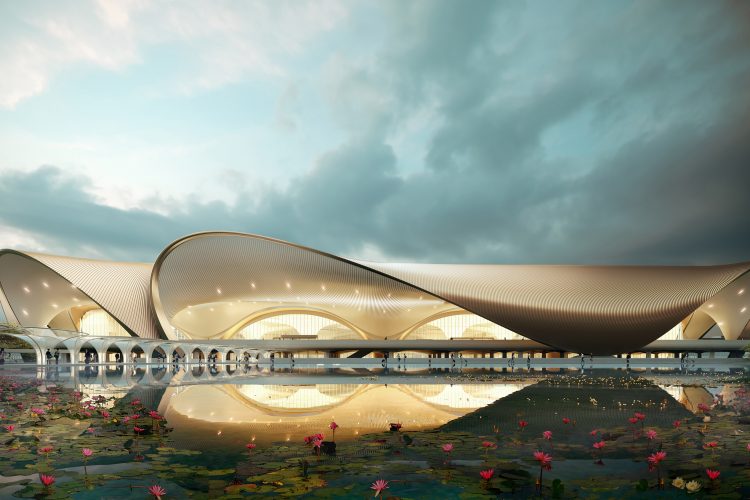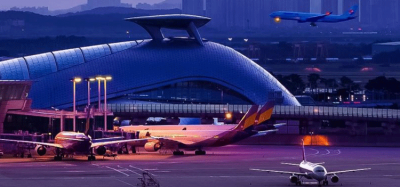Navi Mumbai, India’s newest airport, inaugurated by Prime Minister Modi
Posted: 8 October 2025 | Gabriel Higgins | No comments yet
Prime Minister Narendra Modi inaugurated the first phase of Navi Mumbai International Airport today, marking a major milestone in India’s sustainable, fully digital aviation future.


Credit: Adani
Prime Minister Narendra Modi today formally inaugurated the first phase of the new Navi Mumbai International Airport (NMI), marking a major milestone in India’s civil aviation landscape. The airport is set to become the second major international gateway for the Mumbai Metropolitan Region, joining the established Chhatrapati Shivaji Maharaj International Airport (BOM) and is scheduled to commence operations in December 2025.
Developed by Navi Mumbai International Airport Private Limited (NMIAL), the project is a Public-Private Partnership (PPP) between Mumbai International Airport Ltd. (a subsidiary of Adani Airports Holdings Ltd.), holding a 74 per cent stake, and CIDCO (City and Industrial Development Corporation of Maharashtra Ltd.), holding 26 per cent. Located at Ulwe in Navi Mumbai, the airport site lies approximately 37 kilometres from South Mumbai and will serve as a crucial transport hub for the Mumbai Metropolitan Region and Western India.
A landmark in design and capacity
Once fully operational, the airport will span 1,160 hectares (around 2,866 acres) and feature two Code F-compliant parallel runways, each 3,700 metres long and 60 metres wide. In its initial phase, the airport will handle 20 million passengers per annum (MPPA), expanding to a final capacity of 90 MPPA across four terminals.
The architecture draws inspiration from India’s national flower, the lotus. The terminal design incorporates 12 sculptural feature columns symbolising unfurling petals and 17 mega columns that support the vast roof canopy. This design not only pays tribute to India’s cultural identity but also integrates natural light and airflow for energy efficiency.
Smart, sustainable, and future-ready
NMI has been envisioned as a Green Airport, incorporating advanced sustainable technologies and eco-conscious design principles. The airport’s environmental strategy includes:
- 47 MW of solar power generation in its final phase.
- Rainwater harvesting and wastewater recycling systems to minimise freshwater use.
- Low-flow water fixtures to reduce consumption.
- Deployment of electric vehicles (EVs) on the airside to cut carbon emissions.
- Use of the rockfill method in tarmac construction to enhance structural sustainability.
- Introduction of Automated People Movers (APMs) in Phase III to reduce on-site emissions.
- Passive cooling systems via netted lotus pillars to reduce the need for mechanical air conditioning.
These initiatives align with NMIAL’s vision to create a carbon-conscious aviation hub that sets new benchmarks for airport sustainability in India.
Cutting-edge technology and passenger experience
From digital processing to 5G connectivity, NMI is designed to deliver a seamless, contactless travel experience. The “Connected NMIA” initiative will leverage 5G technology, IoT-based monitoring, and data-driven insights to improve turnaround times and operational efficiency.
Key features include:
- Digi Yatra-enabled entry and boarding, eliminating manual ID and boarding pass checks.
- Automated baggage handling compliant with IATA 753 tracking standards.
- Smart traffic management and real-time monitoring systems for efficient operations.
- An in-house stakeholder app, aviio, to streamline communication and processes.
The airport will also be Wi-Fi-enabled with strong cybersecurity protocols, ensuring smooth connectivity for travellers and airport personnel alike.
Cargo excellence and connectivity
NMI is equally focused on becoming a major air cargo hub, with facilities capable of handling 0.5 million metric tonnes annually in the initial phase, scaling up to 3.2 million tonnes in later phases. The fully automated cargo terminal will feature seven freighter stands, 49 truck docks, and cutting-edge logistics systems designed for cashless, paperless operations.
Dedicated zones will cater to pharmaceuticals, perishables, valuables, express cargo, and live animals, with GDP-compliant temperature-controlled areas and advanced cold-chain logistics.
Strategically located, the airport offers excellent multi-modal connectivity: it is 14 km from Jawaharlal Nehru Port Trust (JNPT), 22 km from MIDC Taloja, and 35 km from Mumbai Port Trust via the upcoming Mumbai Trans Harbour Link.
A destination in itself
Inside the terminal, passengers will find an array of F&B and retail experiences. The first phase includes 110 retail and dining outlets, featuring Bombay Bond, an artisanal tea concept, street food corners, and chef-led restaurants. Duty-free retail will span approximately 1,800 square metres, with an additional 5,000 square metres of retail space dedicated to Indian and international brands.
The Digital Art Programme will celebrate India’s cultural heritage through immersive art, interactive installations, and digital exhibitions showcasing the art and craft of Maharashtra and beyond.
Passenger amenities will include CIP lounges accommodating up to 500 passengers, a transit/day hotel with 80 rooms, baggage delivery and repair services, and kids’ play zones. The airport’s Pranaam Services will offer personalised meet-and-greet experiences.
Commitment to global standards
NMIAL aims to achieve multiple international certifications, including IATA-CEIV, ACC3, RA3, TSA, GDP, and AEO status for its cargo terminal. These accreditations will enhance the airport’s standing as a trusted gateway for international logistics and travel.
As the airport nears completion, Ketan Vaidya, Head of Corporate Communications at NMIAL, emphasised the project’s commitment to innovation and sustainability. “Navi Mumbai International Airport represents not only an engineering milestone but also a step towards a cleaner, smarter, and more connected future for India’s aviation sector,” he said.
With its strategic location, forward-thinking design, and robust infrastructure, Navi Mumbai International Airport (NMI) is poised to become a landmark in India’s aviation landscape, a world-class gateway symbolising the country’s growth, resilience, and global ambition.
Stay Ahead in Aviation — Subscribe for Free!
Get exclusive access to the latest aviation insights from International Airport Review — all tailored to your interests.
✅ Expert-Led Webinars – Learn from industry leaders
✅ Weekly News & Reports – Airport updates, thought leadership, and exclusive interviews
✅ Event Invitations – Be part of the International Airport Summit
✅ Partner Innovations – Discover the latest industry trends
Choose the updates that matter most to you. Sign up now and stay informed, inspired, and connected — all for free!
Thank you for being part of our community. Let’s keep exploring the future of aviation together!
Join our free webinar: Beyond silos: How ecosystem thinking elevates the airport experience
In today’s complex aviation landscape, airports are moving beyond siloed operations to embrace a new era of collaboration. This webinar focuses on how leading airports are using ecosystem thinking to adapt, personalize, and continuously improve every touchpoint, boosting both passenger satisfaction and non-aeronautical revenue.
Date: 13 Nov | Time: 10:00 GMT
REGISTER NOW TO SECURE YOUR SPOT
Can’t attend live? No worries – register to receive the recording post-event.
Related topics
5G, Air freight and cargo, Airlines, Airport construction and design, Airport development, Digital transformation, Innovation, Passenger experience and seamless travel, Security, Sustainability
Related airports
Chhatrapati Shivaji Maharaj International Airport (BOM), Navi Mumbai International Airport (NMI)
Related organisations
Adani Airports Holdings Ltd, CIDCO (City and Industrial Development Corporation of Maharashtra Ltd.), Goods Distribution Practices (GDP), International Air Transport Association (IATA), Mumbai International Airport Ltd., Navi Mumbai International Airport Private Limited (NMIAL), Transportation Security Administration (TSA)


















